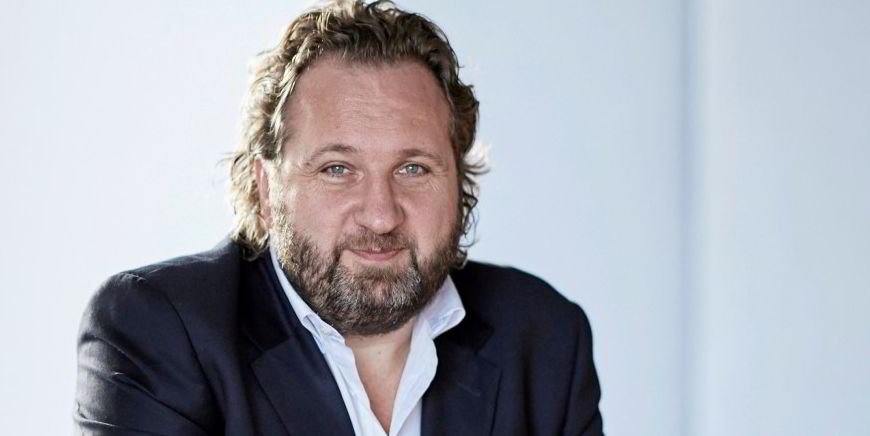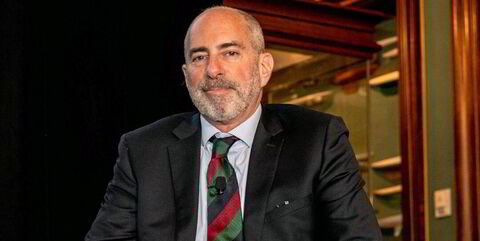Shipping observers could be forgiven for wondering if Andi Case wakes up to the sound of Sonny and Cher’s I Got You Babe on his radio alarm clock each morning.
Because the chief executive of London-listed shipbroker Clarksons, just like Bill Murray in the iconic 1993 comedy, seems to be trapped in his very own Groundhog Day of shareholder protests over pay.
The world’s largest shipbroker has been going through an endless cycle of explanation, consultation and opposition at annual general meetings for eight years as corporate scrutiny has intensified over executive rewards.
But how did the company arrive at this impasse, and what could change in the future?
Shareholder opposition centres on legacy contracts for Case and finance and operations chief Jeff Woyda that reward them with huge bonuses for dual roles. Case remains a major fee-earning broker.
The CEO took home £11.9m ($15.1m) last year. Woyda earned £3.7m.
Shareholder proxy adviser Glass Lewis said that although Case and Woyda had waived part of their bonus in previous years, a company’s pay policy “should not rely on the goodwill of its executives to mitigate excessive payouts”.
This month, 43% of shareholders voted against the remuneration report.
The brokerage said it had “noted” the result of the vote.
“We appreciate the support from most of our shareholders and will continue our engagement over the year ahead,” it added.
Case’s basic salary has been unchanged since 2010 and Woyda’s since 2015, when he also became chief operating officer.
Clarksons is not alone on this issue of course. London-listed broking rival Braemar won only 57% support for its own pay report in December.
The Clarksons vote means the broker remains on the Investment Association’s “list of shame”, where a vote of more than 20% against management wins a company the dubious honour of inclusion.
Eight years of controversy
The trade body and industry voice for UK investment managers maintains this public register following a request by the government, to highlight shareholder unease.
The Investment Association does not comment on individual cases.
But it says in its guidelines that following a big vote against, companies should explain what actions they intend to take to consult shareholders — and then publish an update on views received and actions taken within six months.
The association said investors would like to see shareholder engagement described and an explanation as to why no change of policy has occurred.
“Where the company has appeared on the public register for the same resolution in consecutive years, the statement should acknowledge and set out actions to address this,” the guidelines state.
The issue first reared its head in 2017, when 26% of investors voted against the pay report for 2016.
Proxy adviser Pensions & Investment Research Consultants was opposed then, and remains so now.
And the same counter-arguments have been made by Clarksons each time.
Back then, the broker was stressing that the business competes with mainly privately held rivals, where pay is higher and not subject to such scrutiny.
The company needed its pay structure to “retain key staff in the highly competitive market”, it argued.
Directors point out a massive rise in the market cap from £62m to more than £1.2bn today in the 18 years since Case joined.
But this brings greater scrutiny from larger investors.
New guidelines
The UK Financial Reporting Council drew up new guidelines on corporate governance in 2018, stating that pay “should be designed to support strategy and promote long-term sustainable success”.
“Executive remuneration should be aligned to company purpose and values, and be clearly linked to the successful delivery of the company’s long-term strategy,” they add.
Clarksons has been posting record profits and would argue it meets this definition.
In 2018, the rebels managed a 43% “no” vote.
But Clarksons said it “would be counter to the interests of shareholders to enter into a renegotiation of contractual arrangements”.
At this point, director Ed Warner was chairman of Clarksons’ remuneration committee.
He was replaced by current committee chairman Tim Miller in 2019, which was the year of the closest vote, when 49% of shareholders rebelled.
Meeting the naysayers
By this point, then-chairman Sir Bill Thomas said he considered the issue so important that he, Miller and director Peter Backhouse started a “major engagement process” with shareholders.
It was decided that the policy would remain in place for Case and Woyda, but future bosses would face more traditional corporate deals.
This resulted in 68% backing in 2020.
Since then, results of 60%, 63%, 56% and 57% have been returned in favour.
Proxy firms are still recommending voting down the policy, and Clarksons makes the same arguments in its favour.
The board does not want to break the bosses’ contracts.
But a vote against could mean the end of the very successful Case and Woyda at Clarksons, and would any shareholder seriously want that?
In Groundhog Day, Murray’s Phil Connors was finally freed from his years of purgatory by learning to change his ways.
Clarksons appears unlikely to follow suit any time soon.






